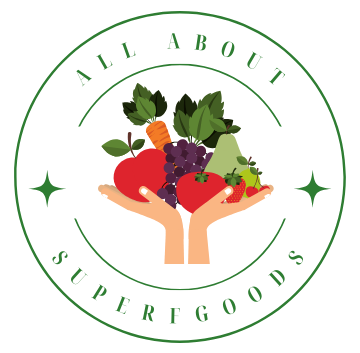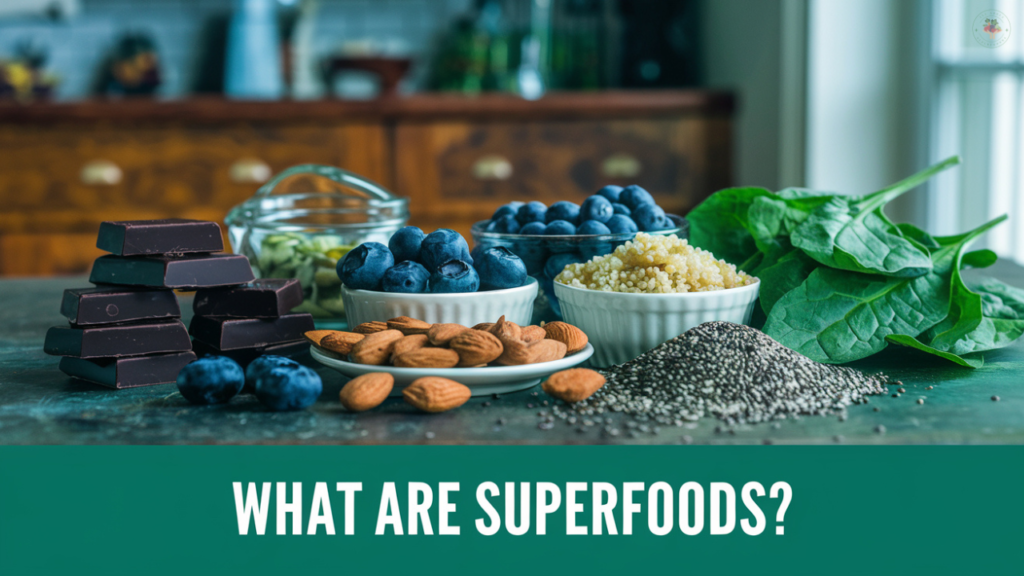The Amazing World of Super-Nutritious Foods
The Amazing World of Super-Nutritious Foods
Imagine a world where certain foods have special powers, just like your favorite comic book heroes. Well, guess what? That world exists, and it’s right in your kitchen! We’re talking about super-nutritious foods, nature’s very own power-packed snacks that can help keep your body strong and healthy. These incredible foods are like nature’s multivitamins, packed with all sorts of good stuff that your body loves. They’re the all-stars of the food world, giving you tons of benefits in just a small amount. Think of them as the MVP players on your health team!
You might already know some of these super-nutritious foods without realizing it. Ever munched on blueberries or spread some avocado on your toast? Congratulations! You’ve already tasted some of these special foods. They’re not some weird, hard-to-find items – many are probably sitting in your fridge or pantry right now!
What makes these foods so special? Well, they’re loaded with important nutrients like vitamins and minerals that help your body stay in tip-top shape. It’s like they have secret ingredients that give your body extra strength and protection against getting sick.
The best part! Adding these super-nutritious foods to your meals can be fun and tasty! You can blend them into smoothies, sprinkle them on your cereal, or even snack on them between meals. It’s like giving your body a power-up in a delicious way!
People all around the world are getting excited about these amazing foods. From the United States to countries in Asia, more and more folks are getting to know how these foods can be a tasty part of staying healthy. It’s a global food adventure, and you’re invited to join! So, are you ready to tap into the powers of these super-nutritious foods? Get ready to dive into a world of colorful fruits, crunchy vegetables, and other yummy treats that not only taste great but also help keep your body strong and full of energy. Let’s learn about how these everyday superheroes can make your meals more exciting and your body feel awesome!
Feed your life with variety, where every meal is a mosaic of nutrients, and let superfoods be the vibrant colors that bring out the best in your health’s masterpiece. Mike J
What Are Superfoods? Defining the Nutritional Powerhouses
When you hear the term “superfood,” you might think of a food with special powers. While these foods don’t wear capes, they do pack a powerful nutritional punch. Let’s break down what makes a food “super” and why these foods are getting so much attention.
The Superfood Definition
Interestingly, there’s no official scientific or legal definition for superfoods 1. It’s more of a popular term used to describe foods that are extremely rich in nutrients and thought to be especially good for our health 2. These foods are often highlighted in health magazines and on food packaging, but it’s important to understand what really makes them stand out.
What Makes a Food “Super”?
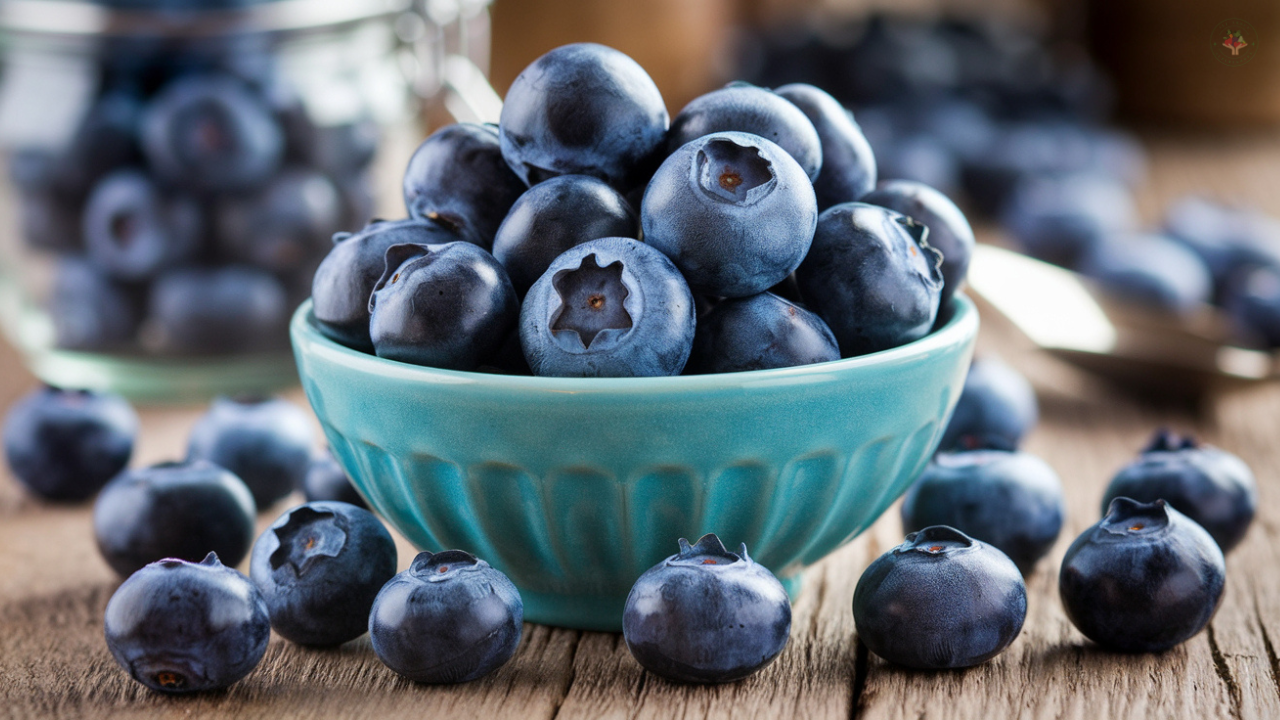
Superfoods are known for their high nutrient density. This means they provide a lot of nutrients relative to the number of calories they contain 2. Here are some key features of superfoods:
- Rich in Vitamins and Minerals: Superfoods often contain high levels of essential vitamins and minerals that our bodies need to function well.
- Packed with Antioxidants: Many superfoods are loaded with antioxidants, which are compounds that help protect our cells from damage 3.
- High in Healthy Fats: Some superfoods, like salmon and avocados, contain beneficial fats that are good for our hearts and brains 4.
- Fiber-Rich: Many plant-based superfoods are excellent sources of dietary fiber, which is important for digestive health.
- Contain Unique Compounds: Some superfoods have special plant compounds that may have health benefits, like the lycopene in tomatoes 5.
Examples of Superfoods
While many foods can be nutritious, some are often labeled as superfoods due to their exceptional nutrient profiles. Here are a few examples:
- Berries: Blueberries, strawberries, and acai berries are rich in antioxidants 5.
- Leafy Greens: Spinach and kale are packed with vitamins and minerals 5.
- Fatty Fish: Salmon is high in omega-3 fatty acids, which are good for heart health 6.
- Nuts and Seeds: Almonds, chia seeds, and flaxseeds are rich in healthy fats and protein5.
- Whole Grains: Quinoa and oats provide fiber and various nutrients 6.
The Truth About Superfoods
While superfoods can be part of a healthy diet, it’s important to understand a few key points:
- No Magic Bullet: No single food can provide all the nutrients you need. A balanced diet with a variety of foods is key to good health 3.
- Marketing Term: Remember, “superfood” is often used as a marketing tool to sell products. It’s not a scientific term 7 8.
- Whole Diet Matters: Instead of focusing on individual superfoods, it’s better to think about your overall eating pattern 1.
- Moderation is Key: Even superfoods should be eaten in moderation as part of a balanced diet.
How to Include Superfoods in Your Diet
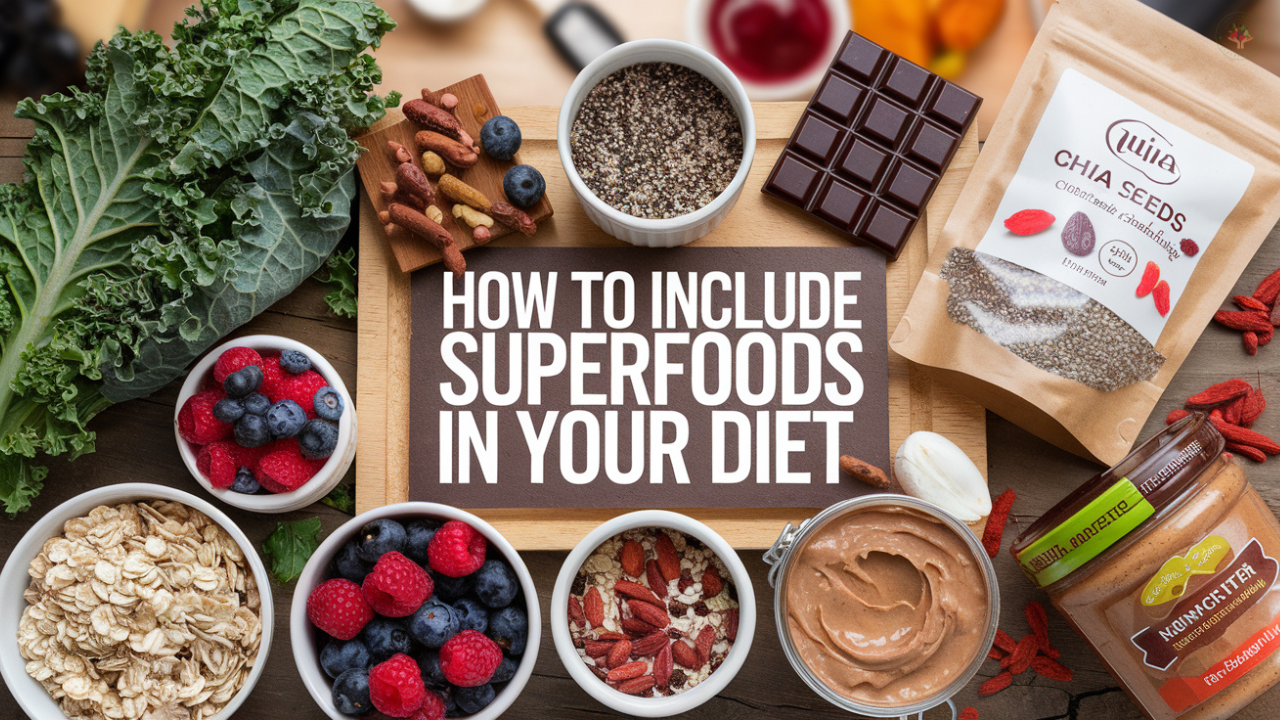
Adding superfoods to your meals can be simple and tasty. Here are some ideas:
- Sprinkle berries on your morning cereal or yogurt.
- Add leafy greens to your sandwiches or salads.
- Use nuts and seeds as snacks or toppings for dishes.
- Include fatty fish like salmon in your meals a couple of times a week.
- Try using whole grains like quinoa as a base for grain bowls 3 9.
Remember, while superfoods can be a great addition to your diet, the most important thing is to eat a variety of nutritious foods. This way, you’ll get a wide range of nutrients to keep your body healthy and strong.
The Science Behind Superfoods: Myth vs. Reality
When we hear about superfoods, it’s easy to think they’re magical foods that can solve all our health problems. But is this really true? Let’s look at what science says about superfoods and separate fact from fiction.
What Science Says About Superfoods
Scientists have studied many foods that people call “superfoods” to see if they really are as good for us as we think. Here’s what they’ve found:
- Nutrient-Rich Foods: Many superfoods are indeed packed with important nutrients. For example, berries like blueberries and acai are full of antioxidants, which are substances that can help protect our cells from damage 1.
- Health Benefits: Some studies show that eating certain superfoods might help lower the risk of some health problems. For instance, eating salmon, which has lots of omega-3 fatty acids, might be good for your heart 1.
- Part of a Healthy Diet: Scientists agree that superfoods can be part of a healthy diet. But they also say that no single food can make you healthy on its own 1 .
Common Myths About Superfoods
Now, let’s look at some common beliefs about superfoods that aren’t quite true:
- Myth: Superfoods Can Cure Diseases Reality: While superfoods can be good for you, they can’t cure diseases on their own. No single food can prevent or cure serious health problems 2.
- Myth: Superfoods Are Always Exotic and Expensive Reality: Many common and affordable foods like blueberries and spinach are just as nutritious as exotic superfoods 3.
- Myth: You Only Need to Eat Superfoods to Be Healthy Reality: Eating a mix of different healthy foods is more important than focusing on just a few superfoods 4.
- Myth: Fresh Superfoods Are Always Better Reality: Frozen or canned superfoods can be just as good for you. They’re often picked and preserved when they’re at their best 5.
What Experts Say
Nutrition experts have some important things to say about superfoods:
- Dr. Marion Nestle, a nutrition expert, says that “superfood” is more of a marketing term than a scientific one. She thinks it’s better to focus on eating a variety of healthy foods rather than just a few “super” ones 6.
- Many scientists agree that while some foods are very nutritious, no single food can provide all the nutrients we need. They suggest eating a balanced diet with lots of different fruits and vegetables 1.
- Experts also warn us to be careful about superfood supplements. These might not give us the same benefits as eating whole foods, and they could even be unsafe if not used correctly 1.
The Reality of Superfoods
So, what’s the real story with superfoods? Here’s what we know:
- Many foods called “superfoods” are indeed very nutritious and can be part of a healthy diet.
- Eating a variety of healthy foods is more important than focusing on just a few superfoods.
- Superfoods can’t replace a balanced diet or cure diseases on their own.
- The term “superfood” is often used to sell products, so it’s important to look at the real nutritional value of foods.
Superfoods can be a great addition to your meals. But remember, the key to good health is eating a balanced diet with lots of different nutritious foods, not just relying on a few “super” ones.
Health Benefits of Superfoods: What Does the Research Say?

Superfoods are often highlighted for their potential to boost health. But what does scientific research actually tell us about these nutrient-packed foods? Let’s examine the evidence behind the health benefits of superfoods.
Nutrient Density and Health
Superfoods are known for their high levels of essential nutrients relative to their calorie content. Leafy greens like kale and spinach are loaded with vitamins A, C, and K, and minerals such as iron and calcium, which are crucial for maintaining strong bones, a robust immune system, and good vision 1,2.
Antioxidants and Cell Protection
Antioxidants are a key feature of many superfoods, helping to prevent or slow damage to cells by free radicals. Berries, dark chocolate, and nuts are all rich in antioxidants. Studies suggest that antioxidants can play a role in reducing the risk of diseases like heart disease and some cancers 3.
Omega-3 Fatty Acids and Heart Health

Superfoods such as fatty fish, including salmon and mackerel, are high in omega-3 fatty acids. These fats are beneficial for heart health. Research has shown that omega-3s can reduce inflammation, lower blood pressure, and decrease risk factors for heart disease 4,5
Fiber, Digestion, and Metabolic Health
Superfoods high in dietary fiber, like beans, whole grains, and certain fruits and vegetables, are important for digestive health. Fiber helps maintain regular bowel movements and can aid in blood sugar control, important for preventing conditions like diabetes. It also contributes to feeling full, which can help with weight management 6,7.
Superfoods and Mental Health
Some studies indicate that superfoods may have a positive impact on mental health. Foods rich in omega-3 fatty acids, such as walnuts and fatty fish, may help reduce the risk of depression Dark chocolate, containing flavonoids, has been linked to improved brain function and mood ,5,3.
The Big Picture
While research supports the health benefits of superfoods, it’s clear that no single food can address all health concerns. A balanced diet with a variety of nutrients is crucial, and lifestyle factors like physical activity and adequate sleep are also important for overall health.
What to Remember
When considering the health benefits of superfoods, keep these points in mind:
- Variety is Key: A diverse intake of superfoods can help you get a range of essential nutrients 1,7.
- Whole Foods Over Supplements: Nutrients from whole foods are typically more beneficial than those from supplements 4.
- Balance Your Diet: Superfoods should be part of a balanced diet that includes a variety of other food groups 7.
- Lifestyle Matters: A healthy lifestyle, along with a diet rich in superfoods, is key to the best health outcomes 5.
Superfoods can contribute significantly to a nutritious diet, but they are most effective when eaten as part of a varied diet and healthy lifestyle. No one food has the power to ensure health on its own, but together, a combination of superfoods and good habits can lead to improved well-being.
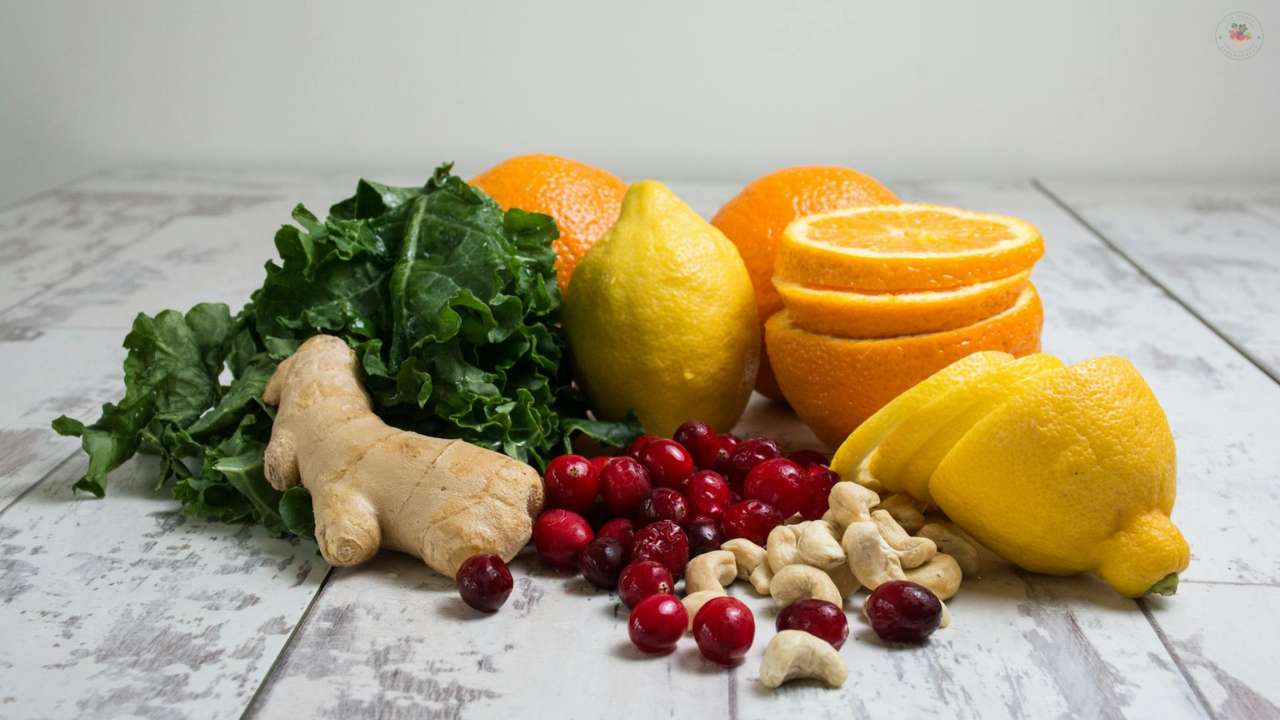
Top 10 Superfoods and Their Unique Properties
When we talk about superfoods, we’re talking about foods that are really good for our health because they’re full of vitamins, minerals, and other things that our bodies need to stay healthy. Here’s a list of ten superfoods and what makes them so special:
1. Blueberries
Blueberries are small but mighty when it comes to their health benefits. They’re packed with vitamin C and vitamin K, and they have a lot of fiber. Plus, they’re full of antioxidants, which help protect your body from getting sick 1.
2. Quinoa
Quinoa is a grain that’s really good for you. It’s got a lot of protein, which helps build muscles, and it’s also a great source of fiber. Quinoa is also gluten-free, so it’s a good choice for people who can’t eat gluten 2.
3. Kale
Kale is a leafy green vegetable that’s loaded with vitamins A, C, and K. It’s also got a lot of minerals like calcium and potassium. Eating kale can help keep your bones strong and your heart healthy 3.
4. Avocado
Avocados are full of healthy fats that are good for your heart. They also have a lot of fiber and potassium, which can help control your blood pressure. Plus, they make a great addition to salads and sandwiches 4.
5. Sweet Potatoes
Sweet potatoes are a tasty vegetable that’s full of vitamin A, which is good for your eyes. They’re also a good source of vitamin C and fiber. Sweet potatoes can be cooked in many different ways, making them a versatile food to enjoy 5.
6. Almonds
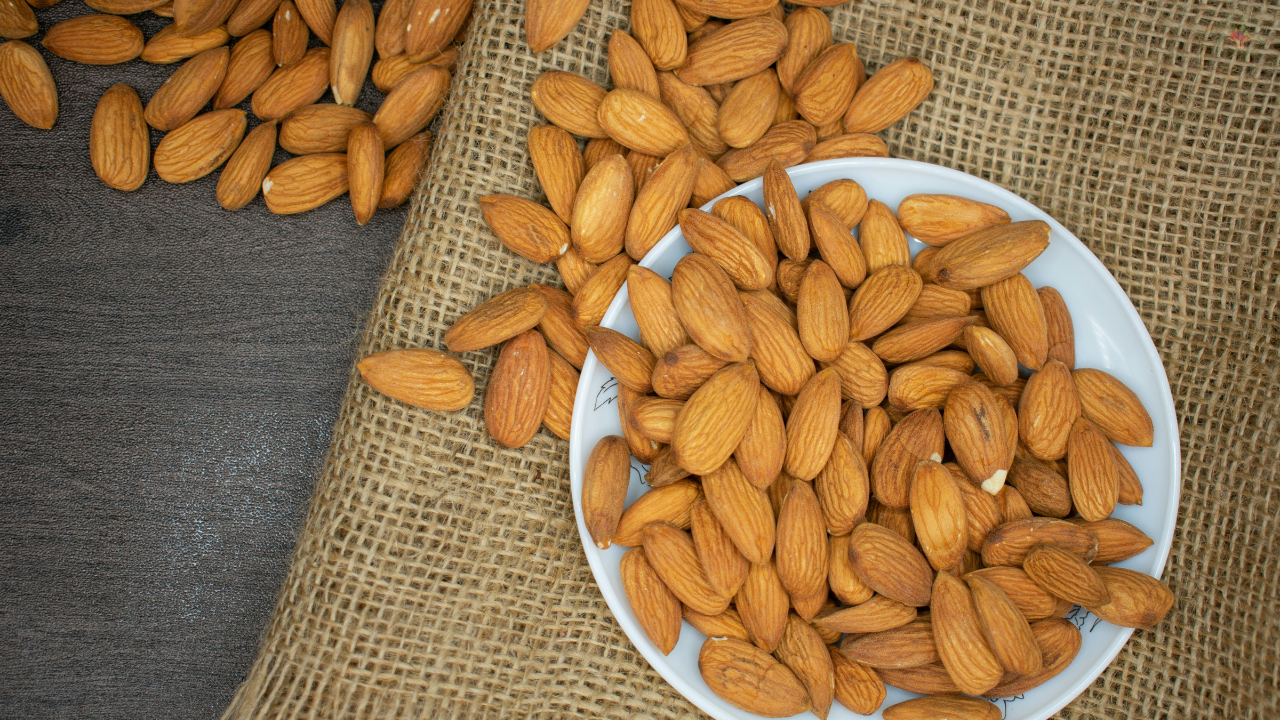
Almonds are a type of nut that’s really good for your heart. They have healthy fats, fiber, protein, and vitamin E. Eating almonds can help lower bad cholesterol levels and they’re a great snack to have on the go 6.
7. Salmon
Salmon is a type of fish that’s rich in omega-3 fatty acids, which are fats that are really good for your heart. It’s also a great source of protein and vitamin D. Eating salmon can help keep your heart in good shape 7.
8. Chia Seeds
Chia seeds are tiny seeds that are full of nutrients. They have a lot of fiber, protein, and omega-3 fatty acids. You can add chia seeds to yogurt, smoothies, or oatmeal to give your meal a health boost 8.
9. Broccoli
Broccoli is a green vegetable that’s full of vitamins C and K, and it has a lot of fiber too. It’s also got compounds that may help protect against certain types of cancer. Broccoli can be eaten raw or cooked, and it’s a great addition to many dishes 9.
10. Greek Yogurt
Greek yogurt is different from regular yogurt because it has more protein and less sugar. It’s also got a lot of calcium, which is important for strong bones. Greek yogurt can be eaten on its own or used in recipes like smoothies and dips 10.
Remember, while these superfoods are great for your health, it’s important to eat a variety of foods to make sure you’re getting all the nutrients you need. And don’t forget to stay active and get enough sleep to keep your body strong and healthy.
Incorporating Superfoods into Your Diet: Practical Tips

Adding superfoods to your diet can be easy and enjoyable. Here are some practical tips to help you include these nutrient-rich foods in your daily meals:
Start with Breakfast
Make your first meal of the day count by adding superfoods. Mix berries into your cereal or oatmeal for extra flavor and vitamins. For smoothie lovers, blend in some kale or spinach for a nutrient-packed drink. Greek yogurt can also be a creamy addition to your breakfast bowl or a smoothie 1.
Snack Smart
Choose smart snacks to keep your energy up throughout the day. Almonds are a portable and heart-healthy option. For a satisfying crunch, pair carrot sticks or apple slices with peanut butter 2.
Makeover Your Meals
Liven up your lunch and dinner with superfoods. Add slices of avocado to your sandwiches or salads for a dose of healthy fats. Replace white rice with quinoa for a protein-rich alternative. Sweet potatoes can be enjoyed baked, mashed, or even as homemade fries 3.
Get Creative with Cooking
Experiment with new recipes that feature superfoods. Roast broccoli with a drizzle of olive oil and your favorite seasonings. Use chia seeds to create a pudding or to thicken soups. When baking, try incorporating whole grain flours or oats for added nutrients 4.
Keep It Balanced
A balanced diet is key, so make sure to include a variety of food groups. This ensures you get a wide range of nutrients essential for good health 5.

Listen to Your Body
Notice how you feel after eating different foods. If certain superfoods make you feel more energetic and healthier, include them more often in your diet. If any foods don’t agree with you, it’s fine to eat them less frequently 6.
By following these tips, you can easily incorporate more superfoods into your diet. Remember to enjoy a variety of foods and pay attention to your body’s signals to maintain optimal health.
Superfoods vs. Conventional Foods: A Comparative Analysis
When we compare superfoods to regular, everyday foods, we’re looking at how much nutrition each one gives us. Superfoods are often said to be packed with more vitamins, minerals, and other nutrients that are good for our health. Let’s take a closer look at how they stack up against conventional foods.
Nutrient Density
Superfoods are often more nutrient-dense. This means they have more vitamins and minerals in each bite compared to conventional foods. For example, kale has more vitamin C than an orange when you compare them weight for weight 1.
Antioxidants
Antioxidants are substances that can prevent or slow damage to cells caused by free radicals. Superfoods like blueberries are known for having lots of antioxidants. While all fruits and vegetables have antioxidants, superfoods are often richer in these helpful compounds 2.
Healthy Fats
Some superfoods, like avocados and nuts, have healthy fats. These fats are better for your heart than the saturated fats found in many conventional foods like butter or cheese 3.
Fiber Content
Superfoods like quinoa and chia seeds are high in fiber, which is important for digestion. Many conventional foods, especially processed ones, don’t have as much fiber 4.
Protein Quality
Superfoods can also be good sources of protein. For example, salmon is a superfood that provides high-quality protein along with omega-3 fatty acids, which are not commonly found in conventional meat products 5.
Sugar Content
Many superfoods, like Greek yogurt, have less sugar than conventional foods. Regular yogurt often has added sugars, while Greek yogurt typically does not 6.
Caloric Content
Superfoods are not always lower in calories than conventional foods, but they are often more satisfying because of their high nutrient content. This means you might eat less overall because you feel full after consuming nutrient-rich superfoods 7.
Accessibility and Cost
One downside is that superfoods can sometimes be more expensive or harder to find than conventional foods. However, many superfoods, like sweet potatoes and broccoli, are available at most grocery stores at a reasonable price 8.
In conclusion, superfoods tend to offer more nutritional benefits than conventional foods, especially when it comes to vitamins, minerals, antioxidants, and healthy fats. However, it’s important to remember that a balanced diet with a variety of foods is the best way to get all the nutrients your body needs.
The Future of Superfoods: Emerging Trends and Research

As we look ahead, the world of superfoods is growing. Scientists are always finding out more about how these foods can benefit our health, and new trends are shaping how we eat.
New Superfoods on the Block
Researchers are always on the lookout for the next big superfood. Foods like moringa, an African plant, and monk fruit, a natural sweetener, are gaining popularity. These foods are being studied for their health benefits and could become common in our diets [1].
Sustainability and Superfoods
There’s a growing interest in how our food choices affect the planet. Superfoods that are sustainable—meaning they’re grown in ways that are kind to the earth—are becoming more important. For example, quinoa is a superfood that doesn’t need a lot of water to grow, making it a more eco-friendly choice [2].
Technology and Superfood Production
Technology is changing how superfoods are grown and produced. Vertical farming, where plants are grown in stacked layers, can produce more food in smaller spaces. This could make it easier to get superfoods in cities where space is limited [3].
Personalized Nutrition
Science is getting better at understanding how different people need different types of food. In the future, we might see diets that are tailored to our own bodies, with superfoods chosen just for us based on our health needs [4].
Superfoods in Snacks and Meals
Companies are finding new ways to include superfoods in everyday products. From snack bars to ready-made meals, it’s becoming easier to eat superfoods without having to prepare them from scratch [5].
Research on Health Benefits
Studies continue to look at how superfoods can help with health issues like heart disease, diabetes, and inflammation. As we learn more, we might see doctors recommending specific superfoods for health problems [6].The future of superfoods is exciting. With new discoveries and trends, we can look forward to finding even more ways to eat well and take care of our health.
Debunking Common Superfood Myths
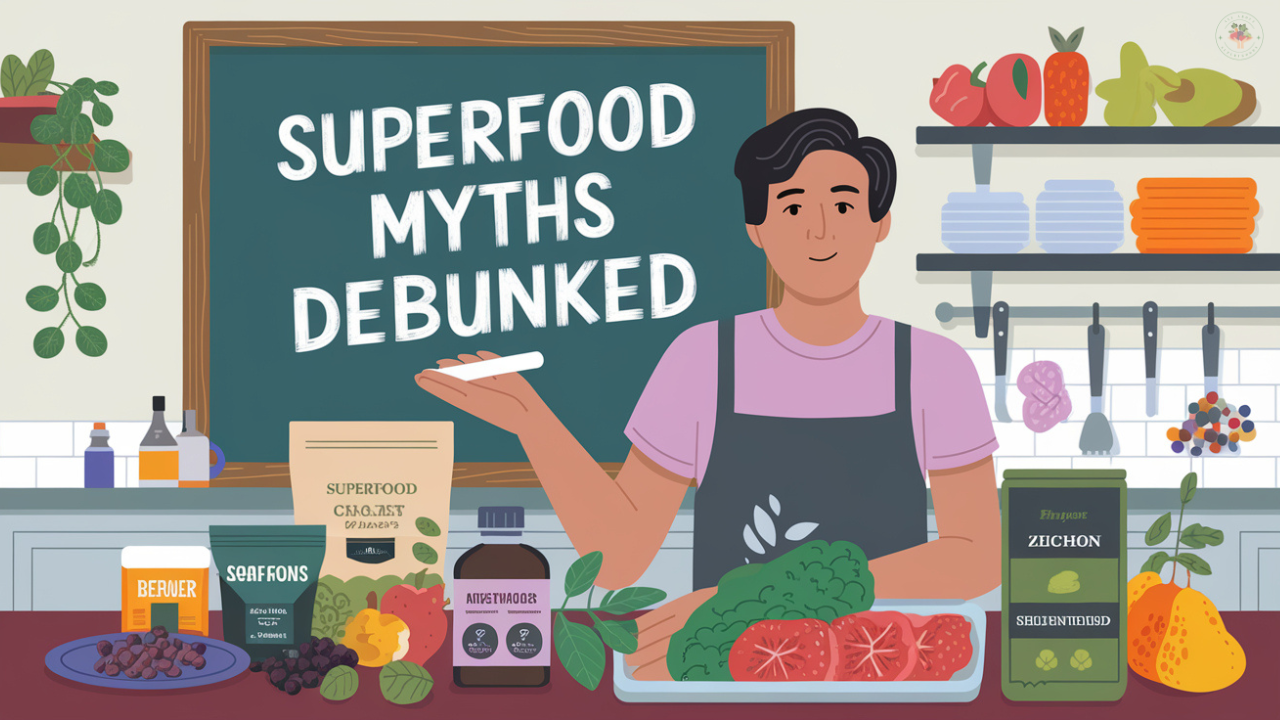
There’s a lot of talk about superfoods and what they can do for you. But not everything you hear is true. Let’s clear up some myths about superfoods.
Myth 1: Superfoods Can Cure Diseases
Some people think that eating superfoods will stop them from getting sick. While it’s true that these foods are good for you, they’re not magic. They can’t cure diseases by themselves. Eating a variety of healthy foods is the best way to stay well 1.
Myth 2: You Need to Eat Superfoods to Be Healthy
It’s not necessary to eat superfoods to maintain good health. Regular fruits, vegetables, grains, and proteins can also give you the nutrients you need. Balance is key in a healthy diet 2.
Myth 3: Superfoods Are Always Better Than Regular Foods
Just because a food is labeled as a “superfood” doesn’t mean it’s the best choice. Sometimes, regular foods have similar or even more nutrients than the expensive “super” versions. For example, oranges have lots of vitamin C, just like the often-touted acai berries 3.
Myth 4: The More Superfoods, the Better
Eating too much of one kind of food, even superfoods, isn’t a good idea. Your body needs a mix of different nutrients that come from a variety of foods. Too much of one thing can actually be harmful 4.
Myth 5: All Superfoods Are Exotic and Expensive
Many superfoods come from faraway places and can be costly. But there are plenty of everyday foods like apples, garlic, and oats that are also considered super because of their health benefits. These are often more affordable and just as good for you 5.
Myth 6: Superfoods Will Help You Lose Weight Quickly
Some people eat superfoods hoping they will help them drop pounds fast. While these foods are healthy, weight loss is about more than just eating superfoods. It involves eating fewer calories and exercising regularly 6.
Remember, no single food has all the answers to good health. Eating a variety of nutritious foods, super or not, is the best way to take care of your body.
Conclusion: The Role of Superfoods in a Healthy Lifestyle

As we wrap up our look at superfoods, it’s clear that they can play a part in a healthy lifestyle. These foods are rich in nutrients and can offer benefits for your health. But it’s important to remember that no single food is the key to good health. Superfoods should be eaten as part of a balanced diet that includes a variety of foods. Eating different kinds of fruits, vegetables, grains, and proteins is the best way to make sure you get all the nutrients your body needs 1.
It’s also important to stay active and exercise regularly. While superfoods are often talked about for their health benefits, they’re not a quick fix. They work best when they’re part of an overall healthy lifestyle that includes regular physical activity and good food choices. And remember, you don’t have to spend a lot of money on exotic foods; many everyday foods are superfoods too 2.
In the end, the best diet is one that you can stick to, that fits your lifestyle, and that you enjoy. Superfoods can be a part of this diet, but they don’t have to be the only part. So, enjoy your superfoods, but also enjoy a wide range of other healthy foods to keep your body and mind strong 3.
FAQs About Superfoods
Superfoods often make headlines, and it’s common to have questions about them. Here are some frequently asked questions to help you understand superfoods better.
What makes a food a ‘superfood’?
A ‘superfood’ is a term used for foods that are thought to be nutritionally dense and thus good for one’s health. They are usually packed with vitamins, minerals, and antioxidants. However, it’s not an official category, and many everyday foods can be just as nutritious 1.
Can superfoods help me lose weight?
Superfoods alone won’t make you lose weight, but they can be part of a balanced diet that supports weight loss. Weight loss is achieved by eating fewer calories than you burn, and superfoods can be nutrient-rich, lower-calorie options 2.
Are superfoods expensive?
Some superfoods can be costly, especially if they’re exotic and have to be transported from far away. But many local and seasonal foods are also considered superfoods, like berries, nuts, and leafy greens, and they can be more affordable 3.
How often should I eat superfoods?
There’s no set rule for how often you should eat superfoods. It’s about the overall quality of your diet. Including a variety of nutrient-rich foods every day is a good approach to health 4.
Do superfoods prevent diseases?
While superfoods are healthy, they are not a cure-all. They can be part of a diet that supports overall health, which may help prevent some diseases. But no single food can prevent or cure illness 5.
Can I eat superfoods if I have dietary restrictions?
Most superfoods are natural and whole foods, so they can fit into many diets. However, if you have allergies or other dietary restrictions, you should check with a healthcare provider before adding new foods to your diet 6.
Remember, balance and variety are key components of a healthy diet. Superfoods can be a part of this, but they’re not the only part. Eating a range of foods and staying active are the best ways to maintain good health.
